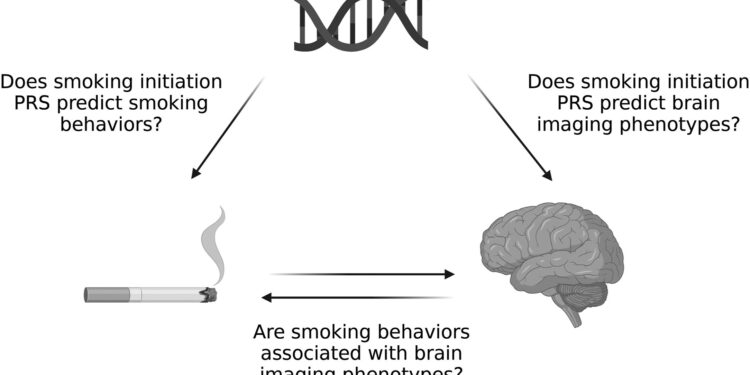Overview of the study. We examined: 1) the predictive ability of the polygenic risk score (PRS) for smoking initiation for a history of daily smoking; 2) the association between smoking initiation PRS for smoking initiation and brain measures; and 3) the association between smoking behaviors and brain measures. Credit: Biological psychiatry Global open science (2023). DOI: 10.1016/j.bpsgos.2023.09.006
Smoking likely shrinks the brain, according to a study by researchers at Washington University School of Medicine in St. Louis. The good news is that quitting smoking can prevent further loss of brain tissue, but it does not return the brain to its original size. Since people’s brains naturally lose volume as they age, smoking actually causes premature aging of the brain, the researchers said.
The results, published in Biological psychiatry: global open sciencehelp explain why smokers are at high risk of age-related cognitive decline and Alzheimer’s disease.
“Until recently, scientists have neglected the effects of smoking on the brain, in part because we focused on all the terrible effects of smoking on the lungs and heart,” said lead author Laura J. Bierut , MD, Alumni Endowed. Professor of psychiatry. “But as we began to look more closely at the brain, it became clear that smoking is also very bad for the brain.”
Scientists have long known that smoking and shrinking brain volume are linked, but they have never known for sure what caused it. And there’s a third factor to consider: genetics. Brain size and smoking behavior are hereditary. About half of a person’s risk of smoking can be attributed to their genes.
To unravel the relationship between genes, the brain and behavior, Bierut and first author Yoonhoo Chang, a graduate student, analyzed data drawn from the UK Biobank, a publicly available biomedical database that contains genetic information, health and behavioral issues affecting half a million people, for the most part. of European origin.
A subset of more than 40,000 UK Biobank participants underwent brain imaging, which can be used to determine brain volume. In total, the team analyzed anonymized data on brain volume, smoking history and genetic risk of smoking in 32,094 people.
Each pair of factors was found to be linked: smoking history and brain volume; smoking-related genetic risk and smoking history; and genetic risk linked to smoking and brain volume. Additionally, the association between smoking and brain volume was dose-dependent: the more packs a person smoked per day, the smaller their brain volume.
When all three factors were considered together, the association between smoking genetic risk and brain volume disappeared, while the link between each of them and smoking-related behaviors remained. Using a statistical approach called mediation analysis, the researchers determined the sequence of events: A genetic predisposition leads to smoking, which leads to a decrease in brain volume.
“It looks bad, and it is bad,” Bierut said. “A reduction in brain volume is consistent with increased aging. This is important as our population ages, as aging and smoking are both risk factors for dementia.”
And unfortunately, the withdrawal appears irreversible. By analyzing data from people who had quit smoking years earlier, researchers found that their brains remained permanently smaller than those of people who had never smoked.
“You can’t undo the damage that’s already been done, but you can avoid causing more damage,” Chang said. “Smoking is a modifiable risk factor. One thing you can change to stop aging your brain and putting you at increased risk of dementia is to quit smoking.”
More information:
Yoonhoo Chang et al, Investigation of the relationship between smoking behavior and overall brain volume, Biological psychiatry Global open science (2023). DOI: 10.1016/j.bpsgos.2023.09.006
Provided by the University of Washington School of Medicine
Quote: Study shows smoking likely causes brain shrinkage (December 12, 2023) retrieved December 12, 2023 from
This document is subject to copyright. Apart from fair use for private study or research purposes, no part may be reproduced without written permission. The content is provided for information only.



